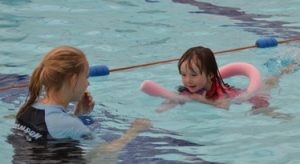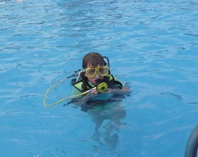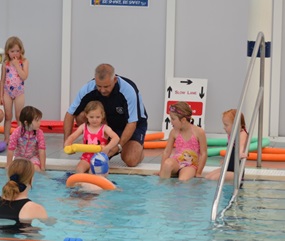Swindon ASC wants your child to learn to swim and have fun while doing so.

Please appreciate that if your child has a fear of water they stand a significantly better chance of overcoming their fear surrounding water with a qualified swim instructor that fully comprehends the complexity and sensitivity of this process. All our teachers and coaches hold current ASA qualifications and follow the Swim England Learn to Swim Framework which has been developed to use fun and games to take children from their first splash through to full competence through ten stages.
All our early stages of learn to swim have a helper in the water. The helper will be one of our young volunteers (aged between 14-21) in most cases, or a qualified swimming instructor.
If you have any concerns regarding the safety or the content of the sessions please speak with either the pool coordinator, or with the instructor when they are finished teaching.
When bringing your child along to swimming lessons emphasise that they are coming along to have fun and play some games with the other children in the water.
Why learn to swim?
Learning to swim is fun, provides health benefits and could save a child’s life. Sadly, drowning is the third most common form of accidental death in children, so learning to swim really is an essential life skill.
The great thing about swimming is that children of any age, size or ability can take part.
Children absolutely love swimming, with one in three saying it’s their favourite family activity.
But it’s not all about having fun, there are other great reasons to get your child swimming:

• It keeps your child’s heart and lungs healthy, improves strength and flexibility, increases stamina and even improves balance and posture.
• Your child will have plenty of opportunities to make friends and grow in confidence.
• Swimming opens the door to other sports and activities, including: diving, scuba diving, rowing and sailing and even becoming the next Olympic or Paralympic champion!
• It’s a skill that once learnt is rarely forgotten – there are even swimming events for those aged over 100.
• Swimming provides challenges, from working through the ASA Awards to perhaps one day swimming the English Channel.
• You can’t always be there. It may save their life one day.
Swimming is an essential skill with huge benefits which last a lifetime. Ultimately, you’re missing out if you can’t enjoy the water.
Parents - your actions prior to, during and after their lesson can help.
Prior to the lesson
Plan to arrive early so there is no rush or panic. Try to enter the pool area with a calm relaxed manner.
Anxious parents = Anxious Children
Your anxiety will be passed on to your child. If you spend all your time assuring your child that they will be okay and safe they will interpret this as you are taking them somewhere dangerous. If you then hand them over to a complete stranger they will feel abandoned. That stranger then will put them into this seemingly dangerous environment. And then you will feel really bad.
What not to say about swimming
| everything will be okay at swimming lessons | We hope it will be and we will do everything in our power to ensure that it will be okay – but by saying this you are introducing an element of fear and uncertainty. |
| you’ll be safe | Yes they will be – But, why say this? Why would you be taking them somewhere dangerous? – saying this just increases their anxiety. |
| the water will be warm | No, it won’t – swimming pools are set at a temperature for water based exercise – it will not feel warm for a child who is clinging to the side and shivering due to not taking part as they were expecting it to be warm. |
| the water won’t ‘sting’ their eyes | But it will feel like it to them – even more so if you tell them this. |
| the water won’t taste / smell funny | Yes it will – all pools have chemicals in them to combat the bacteria. |
| the teacher won’t shout | Yes they will – swimming pools have very bad acoustics – if the one teacher is not shouting another will be – otherwise the child 5m away will not hear them. |
| the teacher won’t make them do anything they don’t want to do | They will ask them to do some (seemingly) pretty strange things, but they won’t force them. Again – why say this? |
| you don’t have to get your hair wet if you don’t want to | Yes you do – the 1st stage of learn to swim includes being ‘comfortable with water being showered from overhead’. You could always get them a swimming hat. |
| you won’t have to get your face/ears wet | Yes you will – the water is not flat it will seem to bounce up and get you wet. |
| you won’t get splashed | Yes you will – we cannot control the water – if a child kicks a little vigorously, the water will splash. |
| it’s not dangerous | Water can be dangerous – that’s why you are bringing your child to swimming lessons so that they can learn to swim. It is important to that they understand that they must do exactly as the teacher asks them. |
Do Say…
Why you are taking them to swimming lessons – that they need to learn to swim so that they can stay safe near water and be able to have fun in the water.

Are you planning a holiday soon? – With a pool? Will you be visiting a water park?
Swimming is a lot more fun when you can do it.

The better swimmer you are the more fun you can have in a pool.
The teacher will ask you to do some exercises in the water which will help you learn to swim and help make your muscles become strong.
Did you know: 71% of the surface of the earth is water.
During the lesson
Sit and watch. Your facial expression can offer praise and encouragement from a distance. If you are not happy with your child’s behavior during a lesson, a frown or scowl can serve as a warning.

Try not to interfere or interject during a lesson. All of our swimming instructors have undergone a significant amount of training to be able to teach. Interfering parents undermine the teacher and disrupt the lesson. It is not fair on your child or the other children in the group.
If you have a particular concern, talk with the pool coordinator or with the teacher when the lesson has finished.
After the lesson
Discuss with you child what they have done. Offer praise for what they did well. Offer encouragement if they were unable to perform a particular task. They will get to have another go next time.
Be patient – They are learning to swim, it will take time and all children learn at a different pace.
Bring a reward for good behaviour during swimming, a snack or a drink straight after the lesson to help take the smell/taste away.
Outside of swimming lessons…

Let you child play in the bath or a paddling pool or a sprinkler & hose pipe in the garden.
At bath time it’s not about the water, it’s about what is happening with the water – shampoo in the eyes, a splashed face, slippery surfaces. You need to help increase your child’s sense of control. Ask what they are afraid of, listen closely to the response and perhaps use the following strategies to help overcome those fears.
• Can’t get your child to sit in the bath? – get in with them.
• Doesn’t like being splashed by a sibling – let them bathe alone.
• Doesn’t like the water in their eyes – give them a flannel to wipe their eyes – knowing that they have a cloth to wipe their eyes can be enough.
• Getting water in their eyes when rinsing – put a picture or toy on the ceiling and get them to look up.
• Let them wash their own hair.
• Make it fun – get some bath toys – make silly hairdos with shampoo.
• Take showers – some kids who hate the bath are fine with shower sprays.
o If showering in the bath – put the plug in to let a pool form.
Swimming strategies
From a sensory point of view – a public pool can be overwhelming for some children – the smell, the noise, the crowds. It can be frustrating for you as a parent to have your child refuse to join in while the fun continues around them. Things you can try that may help;
Take your child swimming.
• Be calm, this is family fun time.
• Try taking them when the pool is quiet (ask the staff at the pool when is best).
• If your child is fearful, respect the fear, do not force them to go any faster than they are able.
• Slowly introduce them to the water – sit them on the side and swish their feet back and forward to let them feel how the water feels on their legs. Let them wash their face with water from the pool.
• Praise every little step and do not remind them of their fear.
• Small steps – if getting their face wet is a big thing – use a sponge or flannel.
• Play.
• Let them watch others having fun.
 Swindon ASC
Swindon ASC